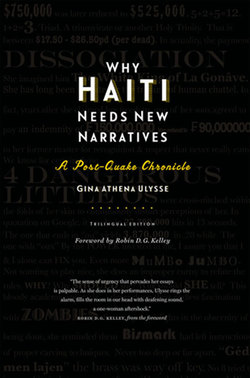Читать книгу Why Haiti Needs New Narratives - Gina Athena Ulysse - Страница 28
На сайте Литреса книга снята с продажи.
Оглавление16
Staging Haiti’s Upcoming Selection
November 24, 2010 (not published)
It would be nothing short of criminal to hold elections now, a Haitian university professor said to me. He uttered those prophetic words in March, two months after the quake. His primary concern was the fact that amid the devastation and rubble, a credible election was virtually impossible.
We were at UMass Boston, participating in the “Haitians Building Haiti: Towards Transparent and Accountable Development” working conference sponsored by Boston-based foundations trying to engage in dialogue to “envision and define a new paradigm for the rebuilding of Haiti.” We discussed the fact that most of those who had been displaced by Goudougoudou, as the quake has been affectionately dubbed, lost their national identification cards. Moreover, the collapse of government’s already weak infrastructure and devastation of so many parts of the country would severely impact participation.
As advocates, activists, scholars, concerned citizens, and development experts of all kinds regarding Haiti, Haitian politics, and the all-too-problematic historical role of the United States and the international community in Haitian affairs, we all knew that regardless of the impracticalities on the ground and the sheer inhumanity of this purported democratic effort, there would be an election of some sort. Indeed, there was simply too much hanging in the balance. Days after our meeting, the UN convened on Haiti, and we learned what would be at stake: to be exact!
The fact that Lavalas, the most popular party, has been left out of the electoral process again seems of little concern to those who claim to want to build Haiti back better. Democracy be damned! It’s never been about numbers anyway. The European Union (EU), the Organization of American States (OAS), and the Caribbean Community (CARICOM)—the institutions that matter in Washington (only when the timing is right)—are backstage ready to play along as official observers. There is only one aim: declare a winner. But not just any winner will do!
When I was in Haiti months ago, before the official CEP list was even made public, rumor had it that Haiti’s future president will be none other than Jude Célestin. And that was well before Wyclef Jean’s public lament for the presidency. Célestin—a technocrat with problematic ties, is President Préval’s protégé and chosen successor. While most of the international news media observe the diplomatic protocol of questioning only so much, Haitian Listservs and websites are buzzing with the sham developing before our eyes. We do know who will suffer in the end.
At this time, it appears that Madame Mirlande Manigat, the female candidate, is leading in the polls. Knowing these so-called polls are just a public performance of participation, we won’t express any surprise when at the last minute or in the runoff, if there is one, Célestin gains ground to surpass the former first lady. The script for Haiti’s future leadership is an old, unedited copy. Some of us familiar with the producers’ modus operandi and tired of the director’s lack of creativity refuse to be in the audience. In many instances, especially those of us in the diaspora, we do have the luxury to do so.
Still, at the annual Haitian Studies Association meetings held at Brown University two weeks ago, concerned Haitian scholars and Haitianists discussed the bleak future of the already compromised republic. In spite of the evidence, many of us hope that we are wrong, that the glass is not empty, as sociologist Alex Dupuy stated in the roundtable on post-earthquake politics and reconstruction. For us, there is simply too much hanging in the balance: 9,???,??? million lives. Indeed, a definitive figure is unknown, since assessment of those who perished in the quake is far from exact!
Days ago, several candidates called for a postponement of the so-called elections while advocates such as the Institute for Justice and Democracy in Haiti (IJDH) have documented election flaws. The New York Times recently reported “Earthquake devastation and a cholera epidemic have kept Haitians angry and distracted from coming elections.” I strongly beg to differ. The natural and man-made disasters since January 12 are not the diversions. It is the upcoming election that is the wag the dog. The state of things after the earthquake was quite clear. Expecting people to be concerned with voting or to not be intimidated to trade their votes in exchange for food and/or security under such compromising conditions is an ill-timed production inspired by Artaud’s theater of cruelty.
The selection slated for Sunday, November 28, is not only criminal but an ugly reminder to those insisting on the charade that the value ascribed to the lives and livelihood of the Haitian masses—who are continually and have been historically disenfranchised by too many in power both at home and abroad—remains zero. And that is in spite of the overwhelming outpouring of support from a global community that obviously seems to think otherwise.
